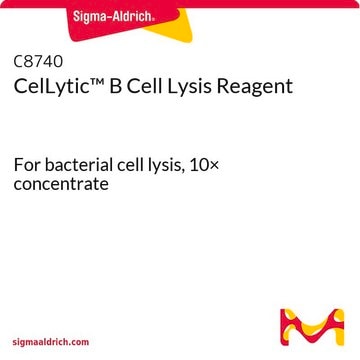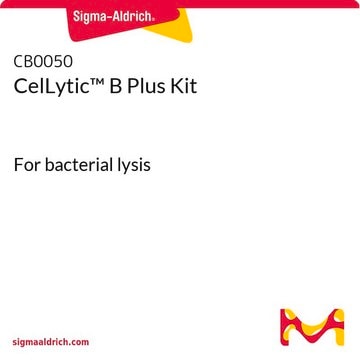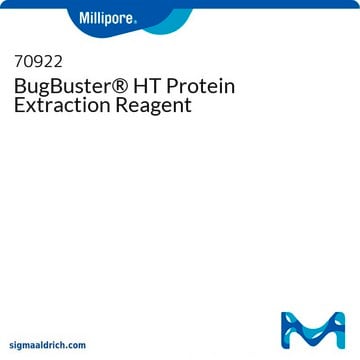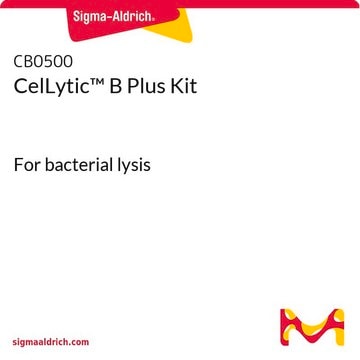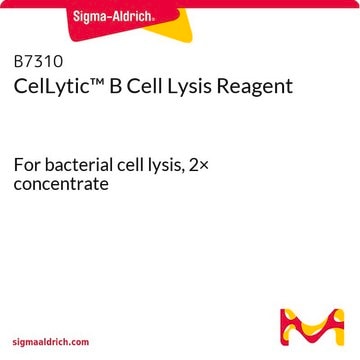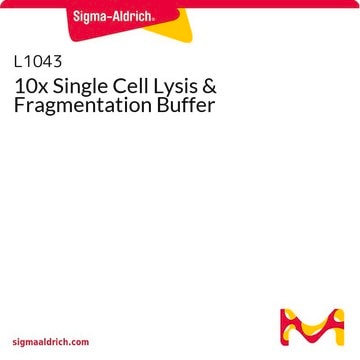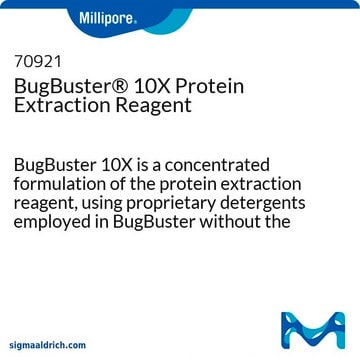C1990
CelLytic™ Express
Synonym(s):
Bacterial cell lysis reagent
Sign Into View Organizational & Contract Pricing
All Photos(1)
About This Item
UNSPSC Code:
41116134
NACRES:
NA.56
Recommended Products
form
powder
shipped in
wet ice
storage temp.
−20°C
General description
CelLytic™ Express is a non-denaturing and highly efficient protein extraction formulation for in-culture bacterial cell lysis. This proprietary powder formulation extracts 2-3 times more protein than conventional methods such as sonication. In addition, the method is fast and requires less sample manipulations, reducing proteolytic degradation and preserving protein activity. Unlike other in-culture lysis products, CelLytic™ Express is a complete formulation including lysozyme and endonuclease. The resulting lysate is completely clear of cellular debris and is immediately ready for affinity purification. CelLytic™ Express unique powder formulation adds minimal volume to the final lysate. It provides a cell lysis method with defined volume and time parameters, making it easier to validate and more convenient for production scale protocols.
Application
CelLytic Express is a non-denaturing and highly efficient protein extraction formulation for in-culture bacterial cell lysis. This proprietary powder formulation extracts 2-3 times more protein than conventional methods such as sonication. In addition, the method is fast and requires less sample manipulations, reducing proteolytic degradation and preserving protein activity. Unlike other in-culture lysis products, CelLytic Express is a complete formulation including lysozyme and endonuclease. The resulting lysate is completely clear of cellular debris, and is immediately ready for affinity purification. CelLytic Express′ unique powder formulation adds minimal volume to the final lysate. It provides a cell lysis method with defined volume and time parameters, making it easier to validate and more convenient for production scale protocols.
CelLytic™ Express has been used as a component in lysis buffer for protein purification.
CelLytic Express is optimized for the lysis of E. coli strain BL21. However, it works well with other commons strains such as JM109. CelLytic Express may also be used on other similar bacterial cells. CelLytic Express has been tested with BL21 E. coli cells expressing histidine-tagged and FLAG fusion proteins. It should be compatib with affinity purification of other fusion proteins.
CelLytic Express is optimized for the lysis of E. coli strain BL21. However, it works well with other commons strains such as JM109. CelLytic Express may also be used on other similar bacterial cells. CelLytic Express has been tested with BL21 E. coli cells expressing histidine-tagged and FLAG fusion proteins. It should be compatib with affinity purification of other fusion proteins.
Features and Benefits
- Efficient and non-denaturing in-culture protein extraction
- Save time by eliminating cell harvest and clarification steps
- Preserve biological activity with fewer manipulations
- Compatible with affinity resins and magnetic beads
- Ideal for Production Scale Extraction protocols
Unit Definition
One unit will lyse 0.6 μg of Micrococcus lysodeikticus per minute by turbidimetric detection at 600 nm when suspended in buffer at pH 6.2 at 25 °C.
Preparation Note
CelLytic® Express is supplied ready-to-use. However, additional reagents may be used depending on the nature of the protein to be isolated. These include salts, protease inhibitors, and reducing agents such as dithiothreitol or 2-mercaptoethanol. The additional reagents should be added into the bacterial culture after dissolving the CelLytic™ Express, and not by adding them to the dry powder.
Storage and Stability
This product ships on wet ice and storage at –20°C is recommended. CelLytic™ Express, as supplied, is stable for at least two years when stored properly.
Legal Information
CelLytic is a trademark of Sigma-Aldrich Co. LLC
Celatom is a registered trademark of EP Minerals, LLC
Signal Word
Warning
Hazard Statements
Precautionary Statements
Hazard Classifications
Acute Tox. 4 Oral
Storage Class Code
11 - Combustible Solids
WGK
WGK 3
Certificates of Analysis (COA)
Search for Certificates of Analysis (COA) by entering the products Lot/Batch Number. Lot and Batch Numbers can be found on a product’s label following the words ‘Lot’ or ‘Batch’.
Already Own This Product?
Find documentation for the products that you have recently purchased in the Document Library.
Customers Also Viewed
Veronica Nasta et al.
The FEBS journal, 287(11), 2312-2327 (2019-11-15)
During its late steps, the mitochondrial iron-sulfur cluster (ISC) assembly machinery leads to the formation of [4Fe-4S] clusters. In vivo studies revealed that several proteins are implicated in the biosynthesis and trafficking of [4Fe-4S] clusters in mitochondria. However, they do not
Emmanuelle Szenker et al.
Cell reports, 1(6), 730-740 (2012-07-21)
Discovering how histone variants that mark distinct chromatin regions affect a developmental program is a major challenge in the epigenetics field. To assess the importance of the H3.3 histone variant and its dedicated histone chaperone HIRA, we used an established
Jiaquan Liu et al.
Journal of molecular biology, 430(22), 4456-4468 (2018-06-05)
DNA mismatch repair (MMR) is a DNA excision-resynthesis process that principally enhances replication fidelity. Highly conserved MutS (MSH) and MutL (MLH/PMS) homologs initiate MMR and in higher eukaryotes act as DNA damage sensors that can trigger apoptosis. MSH proteins recognize
Jun Liu et al.
Eukaryotic cell, 12(12), 1588-1599 (2013-07-23)
Microtubules are versatile biopolymers that support numerous vital cellular functions in eukaryotes. The specific properties of microtubules are dependent on distinct microtubule-associated proteins, as the tubulin subunits and microtubule structure are exceptionally conserved. Highly specialized microtubule-containing assemblies are often found
Our team of scientists has experience in all areas of research including Life Science, Material Science, Chemical Synthesis, Chromatography, Analytical and many others.
Contact Technical Service